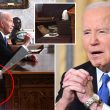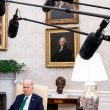Even Biden administration officials are admitting that it took President-elect Donald Trump wading into Israel-Hamas negotiations to close the deal and force a hostage release and cease-fire after 15 months of war.
Multiple insiders and officials in both Israel and the US told The Post that it was Trump’s impending inauguration — combined with the efforts of his Middle East special envoy, Steve Witkoff, that finally solved a problem that had proved intractable for President Biden and his team.
A source with Trump’s transition team described the conversation last weekend between longtime Trump pal Witkoff and Prime Minister Benjamin Netanyahu as “straightforward, no phony platitudes and very direct.”
Another official told Reuters: “Witkoff was able to pressure Netanyahu into accepting the deal and moving quickly. It’s that conversation that shifted everything into motion.”
The agreement ultimately signed Wednesday was very similar to the terms that the Biden administration had been trying to get through since last May.
The first stage is a 42-day cease-fire that begins Sunday, during which 33 Israeli hostages will be released in exchange for Palestinian prisoners.
But, it took Trump’s bully pulpit to force Jerusalem and the Palestinian terror organization to agree by putting pressure on both sides, officials said.
A senior Biden administration official Wednesday praised Trump for setting a sell-by date for the hostage release, saying he forced negotiators’ hands on both sides.
“In any negotiation, any breakthrough diplomacy, sometimes you need a deadline. Sometimes that’s an artificial deadline you try to create,” the official said.
“In August, for example, we came together with a mediator proposal that we we worked hard at [with] three different countries putting it together and tried to set a deadline [to] get this done. And again, as I laid out, we did not succeed in that.”
“The transition from one president to another was one [deadline,]” the official said.
The official also admitted Witkoff “played a very important role in full coordination with [US diplomat] Brett McGurk” in the arrangement — while also giving credit to the Biden administration saying they “worked as partners together, sometime splitting up the role.”
While Biden himself refused to give Trump credit for the deal, Biden officials have publicly praised the cooperation between Witkoff and McGurk.
The official said Biden had “set the tone” for the talks in a meeting with Trump days before the breakthrough talks on Saturday.
Trump has publicly threatened Hamas if hostages were not released by the time he took office.
Incoming national security adviser Michael Waltz told Fox News Wednesday that Hamas agreed to the deal because “they believed President Trump when he said there would be all hell to pay, and any deal that was on the table would only get worse once he was in office.”
The Biden official added that the “catalyst for this intensive diplomacy was the defeat of Hezbollah, the ceasefire in Lebanon and the massive isolation of Hamas,” after Israel defeated Hezbollah.
“That got them back to the table and for the first time to accept a hostage list … that led to this ultimate breakthrough,” the official said.
The second way Trump influenced the ceasefire is due to his significant “leverage” over Israeli Prime Minister Benjamin Netanyahu, whom Witkoff convinced to accept the deal, American and Israeli officials familiar with the negotiations told The Post.
“Just the other day, you know, Brett was leading these negotiations in Doha with [Qatar’s] Sheik Mohammed [bin Rashid Al Maktoum] and the team,” the senior Biden offiicial said. “We wanted to have an engagement with Prime Minister Netanyahu, which Steve went to Israel to do, and came back again.”
He added: “I thought that was quite effective, so, but that’s pretty much how it played out.”
Trump’s leverage comes from his fervent support of the Jewish State, which worked wonders in building their relationship. During his first term in office, Trump took the unprecedented actions of recognizing the Golan Heights region as Israeli territory, moving the US embassy from Tel Aviv to Jerusalem and brokering the Abraham Accords, said Alex Mintz, a senior professor at Israel’s Reichman University.
“Hamas has not changed much of its position and demands,” he said. “Trump was able to push Netanyahu to accept a deal that Bibi refused to accept for many months.”
“The concessions that Israel has made are very, very substantial.”








